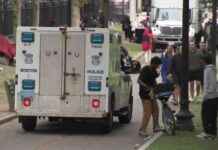The Summer Grand Prix faces its decisive stage. After the first four weekly installments, half of the entrants have already been eliminated, with another four towns waiting in the semifinals. These first programs have been a resounding success for the audiences of Televisión Española, maintaining an average of close to two million viewers and exceeding a 20% share, while waiting to start the next phase.
Starting this coming Monday, August 21, at 10:35 p.m., the Grand Prix semifinals will begin in La 1, the decisive stage to crown a new champion after an 18-year absence. Aguilar de Campoo (Palencia) and Tineo (Asturias) will be the teams that face each other in the last obstacle before reaching the final. They will take the initiative before Alfacar (Granada) and Yepes (Toledo) meet in the second qualifying round.
For the moment Televisión Española has not shared further details of the programs, except for the presence of two new sponsors to support the contestants. The comedian José Mota will be in charge of encouraging the contestants from Palencia, while the actress Elena Furiase will be the representative of the Asturians in the Hot Potato. They will be joined by the entire team along with Cristinini, Michelle Calvó and Wilbur.
The winner of this semifinal will find a place in the grand final, with the possibility of joining the historical record of the contest. Alfacar or Yepes will wait for them, before facing each other in the last program of this edition. Aguilar de Campoo could repeat the victory of Castilla y León in their respective last campaigns, while Tinero will try to become the second Asturian town to be proclaimed champion, after Cudillero in the initial edition of 1995.
This resurrection of the Grand Prix has enjoyed great success, but has met with several setbacks along the way. And it is that the list of localities that were willing to participate was altered on several occasions, for a striking reason: the municipal elections on May 28. The elections changed the composition of some town councils, which had shown their interest in participating before the electoral campaign began.
Once the administrations were reviewed, the RTVE team found some rejections at the table, from the new mayors. The initiative to compete did not continue in some of the preselected municipalities, something that forced Televisión Española to revise the list of towns and cities and choose again. An election that ended without major inconveniences and with the eight locations chosen, of which only four remain standing.








